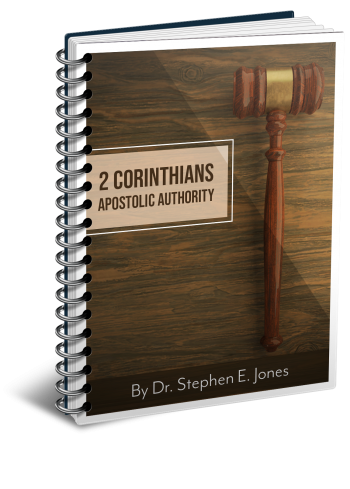Latest Posts
View the latest posts in an easy-to-read list format, with filtering options.

An in-depth commentary/study on the second book of Corinthians
Category - Bible Commentaries

Paul begins his letter with a salutation in 2 Corinthians 1:1, 2,
1 Paul, an apostle of Christ Jesus by the will of God, and Timothy our brother, to the church of God which is at Corinth with all the saints who are throughout Achaia: 2 Grace to you and peace from God our Father and the Lord Jesus Christ.
The salutation is essentially the same as in his first epistle, except that this greeting comes also from Timothy, rather than from Sosthenes. Timothy, who was then accompanying Paul on his journey, would accompany him to Jerusalem. He was well known to the Corinthian believers. It is likely that Sosthenes had already returned to Corinth earlier.
It seems that Paul intended for this letter to be copied and read “throughout Achaia,” and not limited to Corinth itself. Perhaps his first letter had already been given to a wider audience, and so Paul anticipated that his second letter would be treated in the same manner.
In verse 2, Paul gives them a blessing, as if to lay hands on them to impart grace and peace from God. Here, too, Paul reminds them that God is the Father of us all and that all believers are under the lordship of Jesus Christ. This sets the stage for Paul’s claim of apostleship, showing that in the end we are all children of God.
Paul was an apostle “by the will of God,” not by the will of man. While men may or may not have recognized his apostleship, his position did not depend upon their will or their recognition, for no man had made him an apostle. Neither Peter nor any of the other original apostles had ordained Paul. They could only recognize what God had done directly by His own will.
Perhaps we might see a contrast between Paul and Matthias, who was ordained to replace Judas in Acts 1:26,
26 And they drew lots for them, and the lot fell to Matthias; and he was numbered with the eleven apostles.
In Proverbs 16:33 we read,
23 The lot is cast into the lap, but its every decision is from the Lord.
Lots were often cast to determine the will of God, because it took the decision out of the hands of men. They cast lots on the Day of Atonement to determine which goat was to be killed and which was to be sent into the wilderness (Lev. 16:8). The land was divided among the tribes and families by lot (Num. 26:55).
Of course, even the use of lots can be misused, if men use them to inquire the will of false gods. Even if they inquire of the true God, holding idols in their hearts, they may not get an answer that is correct or beneficial to them, since God has the right to answer them according to the idols of their heart (Ezekiel 14:3, 4).
But in the case of Matthias, there is no doubt that the lots were cast with pure hearts, since they were purifying themselves for the feast of weeks, or Pentecost. Matthias was chosen at that time. However, Matthias then largely disappears from church history. It is my opinion that he was chosen by God to be a place-holder, an interim apostle, until Paul was called later that year. I believe that Paul replaced Matthias as the more permanent twelfth apostle.
Both apostles, nonetheless, were called by God, one by lot and the other by the manifestation of Christ. It seems, though, that many in Paul’s day did not accept his teachings that showed a clear distinction between Judaism and Christianity and between the Old and New Covenants. Hence, those people may have pointed to Matthias as the “true” apostle, using him to deny Paul’s position as an apostle.
Paul’s second Corinthian letter, therefore, more fully sets forth Paul’s apostolic credentials to those who were skeptical of him on account of his teaching. Unfortunately, we are handicapped because of Paul’s reluctance to identify his critics.
Paul says in 2 Corinthians 1:3, 4,
3 Blessed be the God and Father of our Lord Jesus Christ, the Father of mercies and God of all comfort; 4 who comforts us in all our affliction so that we may be able to comfort those who are in any affliction with the comfort with which we ourselves are comforted by God.
Paul uses the various forms of the Greek word paracletos, “Comforter” (KJV) or “Helper” (NASB) in John 14:16, 26; 15:26; and 16:7, in reference to the Holy Spirit. The word refers to one who is summoned to come to the aid of another. In a judicial sense, it is an advocate, a counsel for defense, one who pleads the cause of another before the judge.
Paul’s use of this term in connection with “affliction” (thlipsis, “tribulation, persecution”) pictures a time of false accusation against himself and against the church in general. The Holy Spirit is thus said to be the great Defense Attorney in the divine court to rectify all injustice, both now and any time that such help is needed.
Paul says, too, that “our affliction” gives us the ability to comfort others “with the comfort with which we ourselves are comforted by God.” In other words, Spirit-filled believers who have experienced the comfort of God, are able to administer the same comfort to others in affliction. The fellowship of sufferings creates a common bond and understanding between all who are afflicted in similar ways.
But perhaps more important is the fact that those who have learned to overcome in the face of such affliction carry a greater level of authority to comfort those who are still being afflicted.
Paul continues in 2 Corinthians 1:5, 6,
5 For just as the sufferings of Christ are ours in abundance, so also our comfort is abundant through Christ. 6 But if we are afflicted, it is for your comfort and salvation; or if we are comforted, it is for your comfort, which is effective in the patient enduring of the same sufferings which we also suffer.
Paul gives meaning to both comfort and suffering, for he says that it trains us to comfort and assist others in need. 2 Cor. 1:7 says,
7 and our hope for you is firmly grounded, knowing that as you are sharers of our sufferings, so also you are sharers of our comfort.
As children of the same Father, believers share both the comfort of the Holy Spirit and the tribulation in the world. Not only Paul but the Corinthian believers as a whole all suffered affliction and persecution in their own way. Hence, they all had a common bond and could understand what others were going through in their afflictions.
This commonality gives Paul “hope” (i.e., an expectation) that the Corinthian church will understand what he himself has experienced at the hands of his critics. Paul was laying the groundwork for his defense of apostleship, being confident that the church would understand his position and affliction.
2 Corinthians 1:8-10 says,
8 For we do not want you to be unaware, brethren, of our affliction which came to us in Asia, that we were burdened excessively, beyond our strength, so that we despaired even of life; 9 indeed, we had the sentence of death within ourselves in order that we should not trust in ourselves, but in God who raises the dead; 10 who delivered us from so great a peril of death, and will deliver us, He on whom we have set our hope. And He will yet deliver us.
As I said in the introduction, Paul’s life had been in danger in Ephesus, for which cause the local believers there had insisted that he flee the city immediately (Acts 19:30, 31; 20:1). He went to Macedonia for three months, and then when he was ready to sail for Syria, he learned of a plot against his life (Acts 20:3). He changed his plans, returning to Asia by the long route through Macedonia.
The book of Acts does not give any details of the plot against his life, but from what Paul told the Corinthians, he must have been very close to being killed. In fact, “he was accompanied by Sopater of Berea… and by Aristarchus and Secundus of the Thessalonians” (Acts 20:4). No doubt these three acted as Paul’s bodyguards to Philippi. Paul apparently hid there from the assassins, sending others ahead to make sure the way was safe for him to take the ship to Troas (Acts 20:5, 6).
At Troas Paul raised Eutychus from the dead, a miracle that strengthened the faith of the believers and reminded them of God’s power to raise the dead. After all, if God could raise the dead boy, could He not also raise Paul himself from the dead, if he were to be assassinated? The lesson Paul derived from that miracle is reflected in verse 9 above, where he says that although “we had the sentence of death within ourselves,” even so, “we should not trust in ourselves, but in God who raises the dead.”
Paul must have been in danger still, for he sent his companions on the ship from Troas to Assos, while he himself took the land route (Acts 20:13, 14). At Assos the band met at a prearranged location, and from there they all took a short boat ride to Mitylene (or Mytilene), the chief city on the island of Lesbos.
From there they sailed to a place “opposite Chios” (Acts 20:15). Chios was an island just south of Lesbos, directly west of Smyrna. The band then sailed to Samos, an island off the coast of Ephesus, and the next day landed at Miletus just south of Ephesus.
Paul was in a hurry to get to Jerusalem before Pentecost. Acts 20:16 says that “Paul had decided to sail past Ephesus in order that he might not have to spend time in Asia.” By this time, Paul seems to have been sure that the assassins had lost track of him. It also appears that Paul wrote his “Second Corinthians” letter while he was on the ship between Assos and Miletus.
Paul sent word to Ephesus, asking the elders of the church to meet him in Miletus (Acts 20:17). There he gave them an account of his ministry since he had seen them the previous year. His admonition to the elders is rather lengthy (Acts 20:18-35), and here he began to talk of his impending death, saying in Acts 20:29,
29 I know that after my departure savage wolves will come in among you, not sparing the flock.
The plots against his life seemed to tell him that his ministry was nearing an end, and no doubt he had prayed for revelation about this. It is likely that Paul then entrusted these elders with his letter to the Corinthian church, and it is also likely that the church in Ephesus actually read the letter even before the Corinthian church received it.
Paul then continued his journey toward Jerusalem, stopping at Caesarea. There the prophet Agabus prophesied that Paul would be bound in Jerusalem (Acts 21:10, 11). His troubles were only beginning, for another plot against his life was soon to be hatched in Jerusalem (Acts 23:12-14).
It was in the midst of these life-threatening afflictions that Paul wrote his letter which we know as Second Corinthians. Paul greatly appreciated their prayer support during that time, for after speaking of his afflictions, he said in 2 Cor. 1:11,
11 you also joining in helping us through your prayers, that thanks may be given by many persons on our behalf for the favor bestowed upon us through the prayers of many.